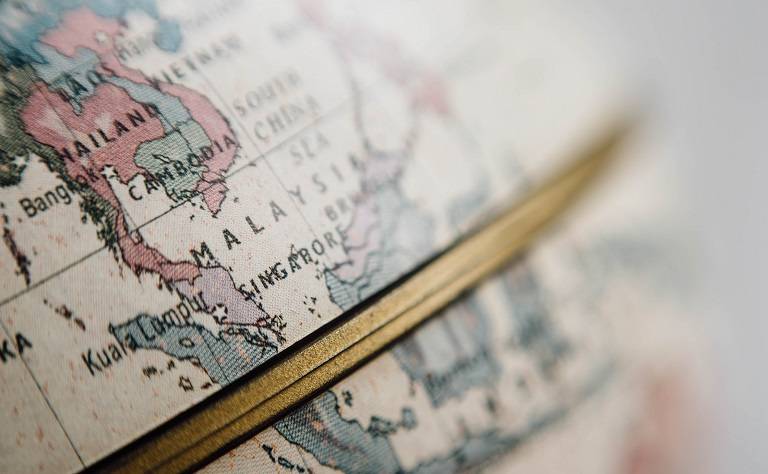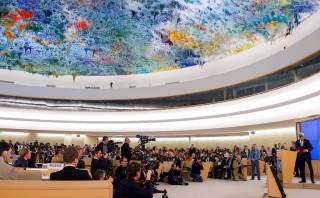Are National Human Rights Institutions Always the Answer? The Asia Pacific Experience
12 October 2016
Julia Kreienkamp (GGI Research Assistant) on a GGI keynote lecture with human rights expert Chris Sidoti.

Over the past two decades, National Human Rights Institutions (NHRIs) have emerged as unique, yet understudied, actors in promoting human rights both domestically and internationally. In the Asia Pacific, NHRIs have a particularly important role to play given the absence of any intergovernmental human rights mechanism in the region. However, their effectiveness depends largely on the domestic political, legal and social conditions.
What happens if the independence of an NHRI is compromised? Can and should regional NHRI networks support institutions in authoritarian states or in the context of civil war? In an engaging and thought-provoking talk at the Global Governance Institute, leading human rights expert Chris Sidoti addressed these thorny issues.
What are National Human Rights Institutions (NHRIs)?
NHRIs are established by states in order to protect, monitor and promote human rights. They can take a variety of forms, the most common being human rights commissions or ombudsmen. Just like courts, NHRIs are part of the state structure and funded by the state but operate independently and at arm's length from the government.
As Sidoti explained at the beginning of his talk, NHRIs are a relatively new phenomenon. While the concept was born in the late 1940s, NHRIs only started to proliferate after the end of the Cold War. The United Nations has played a critical role in supporting this trend. Quite unusually, however, it was not the driving force behind drafting the main evaluation criteria for NHRIs - the Paris Principles.
The Paris Principles ("Principles relating to the status of national institutions for the promotion and protection of human right") were formulated by NHRIs themselves during the first international workshop of national institutions held in Paris in October 1991. The principles, which were subsequently endorsed by the Commission on Human Rights and the General Assembly, set out international standards for NHRIs, including independence and autonomy from the government, a broad mandate to promote and protect human rights, a pluralist composition, adequate resources and the power of investigation. Compliance with these standards is fundamental to receiving international recognition and access to the UN Human Rights Council and other bodies.
In addition to UN support, NHRIs have significantly benefited from peer support, encouragement and promotion. This has been especially true in the Asia Pacific, where the regional NHRI network - the Asia-Pacific Forum of National Human Rights Institution (APF) - has become influential in supporting and strengthening new and existing NHRIs.
NHRIs in the Asia Pacific Region: The APF as a 'gatekeeper'
Since the fundamental eligibility criterion for APF membership is compliance with the Paris Principles, the network plays a critical "gatekeeper" role in the region. In this function the APF has repeatedly been forced to react to political changes in its member countries or to take difficult decisions on whether or not to support NHRIs in repressive regimes.
Sometimes these decisions can be relatively straightforward. When the Iranian Islamic Human Rights Commission, which had been established by the Supreme the Court, applied for full APF membership, it was refused because it did not fulfil the formal requirement for a constitutional or legislative basis as set out in the Paris Principles.
Usually, however, these decisions are not just a question of formality - they also require a careful assessment of the situation on the ground. When Myanmar's military dictatorship sought advice on setting up an NHRI in 2001, the APF decided not to provide any support. As Sidoti explained, at the time there was no reason to believe that the institution would have any room for independence at all. In contrast, the Indonesian Commission on Human Rights, which had been established under the Suharto regime, managed to become an independent force and later played an active part in the country's democratic transition. The key difference in the Indonesian case, was the existence of "some democratic space" - as Sidoti put it - that the NHRI could inhabit. Of course, it is difficult to determine in advance whether an NHRI set up in such an environment will in fact successfully exploit the little room for independence that it has. It is therefore just as important to think about how much harm an NHRI can potentially cause by legitimising a repressive regime.
In the past, the APF has also demoted existing members to associate level as a reaction to changing domestic situations. The Fiji Human Rights Commission, for instance, lost APF support after it had released a report that openly supported the 2006 military coup (it subsequently resigned its membership in the APF). More recently, the NHRI in Thailand, which had remained silent during the 2014 military coup, was demoted to associate membership. It should be noted, however, that a demotion does not mean no engagement at all. Associate members still receive legal advice and assistance and can eventually (re-)apply for full membership. In fact, the Fiji Human Rights Commission might be re-admitted in the near future, according to Sidoti, as well as the Human Rights Commission of Sri Lanka, which had been demoted after it had been compromised in the country's civil war.
What can we learn from these examples?
Overall, the APF seems to have been reasonably effective in strengthening NHRIs in the region. It provides an interesting example of a "quasi-governmental" network or club with tangible benefits offered to "club members" (including international recognition, opportunities for collaboration and access to advice, training and resources) in exchange for compliance with the Paris Principles. As such, the APF may provide relevant lessons learned for other regional NHRI networks as well as similar networks in other issue areas.
While the Paris Principles continue to provide the main normative grounds for assessing NHRIs, Sidoti's presentation highlighted the need for a flexible interpretation of these standards. Formal compliance does not guarantee effectiveness in protecting and promoting human rights. At the same time, some NHRIs have managed to be reasonably successful despite not being able to fully comply with the Paris Principles. The NHRIs in Palestine and Afghanistan, for instance, were both accepted as full APF members despite the fact that they are completely funded by donors. The Paris Principles provide a useful basis for assessing the structural, personal and financial independence of NHRIs but we need better insights into how to evaluate their effectiveness beyond these standards.
In concluding, Sidoti reminded his audience of the difficult circumstances in which many NHRIs in the Asia Pacific region operate. Even in stable democracies they can come under pressure. The Australian Human Rights Commission, for example, saw its budget significantly cut after it published a report on the detention of asylum seekers in 1998. Nevertheless, Sidoti ended his talk on an optimistic note: NHRIs, he argued, will continue to proliferate and their average level of effectiveness will continue to increase. Indeed, maybe "the best indicator for a good NHRI is a tense relationship with the government".
 Close
Close


